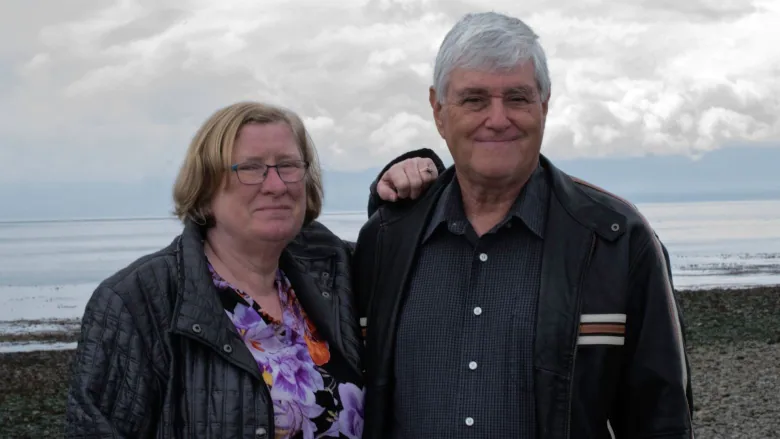Canadian Transportation Agency says staffing issues generally warrant compensation

A recent Canadian Transportation Agency (CTA) decision was supposed to help clear the air on flight compensation.
When issuing a decision in a WestJet case on July 8, the transport regulator clarified that, in general, airlines can’t deny passengers compensation for flight disruptions caused by crew shortages.
However, the clarification has only ignited fury for some passengers, including Frank Michel, who have since been denied compensation — due to crew shortages.
“It’s insulting,” said Michel of Marquis, Sask.
He and his wife, Leigh, flew with Air Canada in June. The couple’s flight from Regina to Victoria was delayed by more than five hours. Then, the second leg of their return flight was cancelled, so the couple wound up spending the night at the Vancouver airport.
“I’ve got arthritis, I’m aching and sore, I’m sleeping on a frigging concrete floor,” said Michel, 67.

The couple applied for compensation, which would total $2,800 if they qualified. But in late July, Air Canada rejected the Michels’ claim. In two separate emails seen by CBC News, the airline said each flight disruption was “due to crew constraints” linked to COVID-19 and was “safety-related.”
Under federal rules, airlines only have to pay compensation — up to $1,000 per passenger — if the flight disruption is within the airline’s control and not safety-related.
Michel argues Air Canada isn’t playing by the rules.
“CTA has already made it clear that crew constraints is not an acceptable excuse,” he said. “It’s not a safety issue. It’s a management issue. You have to manage your resources.”
- Giving sleeping mats to stranded Winnipeg-bound passengers an ‘insult’ by Air Canada: advocate
- More Air Canada, WestJet passengers baffled by reasons for denied compensation
‘This decision doesn’t seem to mean anything’
The CTA issued its clarification last month based on a case where WestJet denied a passenger compensation, claiming his flight had been cancelled for safety reasons due to a crew shortage.
In its ruling, the CTA emphasized that staffing issues are largely an airline’s responsibility and typically warrant compensation. Thus, it ordered WestJet to pay the passenger $1,000.
“Training and staffing are within airline control and therefore crew shortages are within airline control, unless there’s compelling evidence” to the contrary, said CTA spokesperson, Tom Oommen in an interview. “It’s a high threshold.”
Watch: Air passengers say they’ve been unfairly denied compensation:
https://www.cbc.ca/player/play/2059818051954/
Some travellers say they’re being denied compensation for cancelled Air Canada flights as the airline claims the flight disruptions were ‘due to crew constraints’ and beyond their control.
Oommen said the CTA’s decision will help ensure airlines follow the rules, but some passengers remain skeptical.
“This decision doesn’t seem to mean anything,” said Jennifer Peach of Langley, B.C., who, along with her husband, had booked a trip with WestJet to attend a wedding last month in St. John’s.
They almost didn’t make it. WestJet cancelled their connecting flight and Peach said the airline then offered to rebook them on a flight one day later — which would mean they’d miss the wedding.
Fortunately, Peach found a Porter Airlines flight that would get the couple to St. John’s about five hours later than originally scheduled, but still in time for the wedding. She said WestJet told her to book the flight and file for compensation.
- Complaints over denied compensation for flight delays still unresolved following lengthy inquiry
- B.C. woman wins $1,200 payout from Air Canada after baggage was delayed 2 days
Peach asked WestJet for the $773 total she paid for the Porter flight, plus compensation for the couple’s delayed trip. On Aug. 2nd, WestJet turned down both requests, stating in an email seen by CBC News that the flight cancellation “was due to crew member availability and was required for safety purposes.”
That didn’t sit well with Peach, especially in light of the recent CTA decision.
“I don’t know what’s going on here,” she said. “I would assume that if there’s a decision like this made by the Canadian Transportation Agency that it would be the sort of the benchmark for all of these [claims].”
Enforcement options ‘could include fines:’ CTA
WestJet and Air Canada each declined to comment on individual cases, but both said they abide by federal air passenger regulations. WestJet said that safety is its top priority. Air Canada said airlines shouldn’t be penalized for cancelling flights for safety reasons.
Air passenger rights expert Ian Jack said the CTA needs to threaten airlines with harsh penalties, such as public shaming and stiff fines, if they fail to comply with compensation regulations.
“The major concern is that the regulator is not exactly striking fear into the hearts of the carriers to make them follow the rules,” said Jack, a spokesperson with the Canadian Automobile Association, a non-profit travel agency.
“They need to know that they might get caught, embarrassed and called to task by the regulator.”

CTA’s Oommen suggested that tough penalties may be coming for non-compliant airlines.
“We are indeed looking at all the enforcement options … which could include fines.”
Meanwhile, both Michel and Peach have filed complaints with the CTA. However, they may be in for a long wait. The agency is currently dealing with a backlog of more than 15,000 complaints, Oommen said.
He said the CTA recently made changes to streamline the complaints process and is trying to hire more staff.
But Jack said he’s concerned the backlog may encourage airlines to flout the rules, because any repercussions will be far down the road.
“They don’t have to pay out today, and who knows, maybe in 2025, they might have to pay money.”


